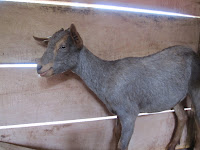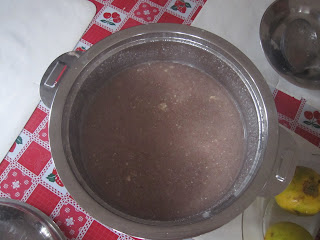If development work is like a roller coaster, we've been in the front row of Nitro for the past two weeks.
Although it has been a while since our last post, our project has not made any physical progress. We are still in the process of developing plans. This has been a tedious balancing act between meeting our project goals and meeting the expectations of Duma. The NGO continues to see our project as a political tool to smooth over relations with its membership. Until yesterday, we took the multiple beatings. The original intention of the project was to help a school get some milk revenue and act as a training site for the kids.
But Francis was inspired by the Farm Africa project in Babati, where a group of mostly women farmers spontaneously formed a successful goat-rearing collective. It seems that Francis wants to duplicate this collective model by establishing a group to be administered by Duma. Presumably, this would allow Duma to become the central site for Togenberg goats in the Kilimanjaro region, which would be a lucrative outcome given the high demand for the breed throughout East Africa. With this vision in mind, Francis suggested the scope of the Lata School project be restricted to a buck breeding center. This would keep bucks separate from does and help to ensure the purity of the breed, but as a result, the school wouldn't receive any milk proceeds nor would the students receive any milk.
This would have been an unacceptable outcome given the intentions of our grant proposal. Thus far, we have allowed Francis to have her way when it comes to major project decisions even when we disagreed with them, using our flexibility to garner her trust and friendship. No more. Today we wrote a MoU that we believe takes into account the interests of NGO without railroading the school.
We have always intended this project to be based in bottom-up, grassroots methodology. The idea for a livestock project at the school as conceptualized by the school last year during Jake's research. At every stage of this process, we were determined to get community and NGO input. What is becoming more clear is that the NGO values this project as a capital and status-building project as much as it sees the cash injection we offer as an investment in the community. This is not to say it would be a bad thing to help Duma build its profile, in fact, we think this would be a good thing. But that profile building is a second-tier objective at best, and furthermore, we believe the NGO could accomplish it through the framework the school has outlined.
Below is the draft MoU, feel free to contribute your thoughts:
MoU
The following document constitutes a Memorandum of Understanding (MoU) between Projects Managers (PM) operating within Duma, the Director, and the Lata Primary School (LAT) and outlines the framework of protocols, responsibilities, relationships, and requirements of implementing projects under Duma.
LAT agrees to allow Duma to use the school plot as a livestock farm. Duma retains the right to use this farm as an educational center and as the core capital for a micro-lending operation involving female offspring from the central farm. The specifics of the lending scheme will be determined by Duma and LAT with community input.
Giving Animals to LAT
- Duma agrees to provide funding for a secure livestock shelter to be built using local materials and local labor. Duma agrees to provide a daily meal for each laborer.
- LAT agrees to provide labor for animal shelter.
- During project implementation, Duma will provide animal feed for a pre-determined period of time, after which LAT is solely responsible for providing feed.
- Duma will loan 10 goats to the LAT, comprised of two 100 percent males, two 100 percent females, four 75 percent males and four 75 percent females.
- LAT will receive from the milk of all goats at the school.
- Duma assumes responsibility for initial veterinary fees for a period to be determined by an agricultural extension officer.
The LAT assumes responsibility for the wellbeing and value of the livestock such that:
(a) the LAT will provide all necessary water and food, including modifying the existing plot to serve as a pasture to eliminate the need to purchase feed.
(b) the LAT will oversee the daily cleaning of livestock stalls including weekends and weekdays.
(c) the LAT, in conjunction with the agricultural extension officer, will manage a buck center to control pregnancy and inbreeding.
(d) the LAT will ensure the security of the livestock at all times and will hire a nightwatchmen to ensure animals' safety and the safety of Duma's property.
(e) The LAT will closely monitor livestock health and will report any symptoms to the agricultural extension officer and the Director.
(f) The LAT wgill be responsible for milking the livestock twice daily.
Before receiving the repayment of its loan, Duma reserves the right to relocate the livestock under the following condition:
- LAT fails to meet any of the above conditions such that the value of the livestock and the sustainability of the project are at risk as determined by the Director and a representative from the government livestock extension office.
In order to ensure proper care, LAT may be responsible for hiring a full-time livestock manager funded by proceeds from the project. If the school identifies a trustworthy candidate for this full-time position prior to October, 2009, Duma agrees to provide extensive training for this person through the Livestock Training Institute. This person cannot be a teacher or an immediate family member of any teacher. This person will be responsible for training members of the community.
Teachers will use dairy products and profits derived thereof to supplement students' diets and for the care and treatment of animals. No teacher shall derive personal profit from the products of the central project site.
Teachers are responsible for teaching LAT parents and community members about proper animal husbandry techniques. All community members and Duma members will be allowed to breed their goats with the 100 percent bucks located at the school in exchange for two bushels of feed.
Loaning Animals
When the four 75 percent females give birth to four female kids, they will be divided as follows:
- Two will be loaned from the school to the community in terms determined by the community in a group meeting.
- Two will be given to Duma members in terms determined by Duma members.
They will be divided in the following order:
- The first and third female kid will go to the community.
- The second and fourth female kid will go to Duma.
- Any male kids will be returned to the school to be sold.
The offspring of 100 percent goats will be divided as follows:
- The first male and female offspring of the 100 percent goats will go to Duma to start a new project. All other 100 percent offspring belong to LAT.
After the initial four kids, LAT will be in full ownership of all bucks and does as well as any future kids. It is our recommendation that LAT continue lending a proportion of offspring to the community..
This MoU will be signed by the PM, the Director, and the LAT principal to ensure mutual agreement and understanding.
--------------------------------------------------------------------------------------------
On a lighter note, we discovered our own naivete in the process of training secondary school students to conduct a wealth assessment. We provided secondary school students with questionnaires asking about differences between the poor, middle-class, and wealthy. Jake suggested that we have the students ask us the questions as practice and a cultural exchange. Sam was initially hesitant, but it went swimmingly.
We encouraged the students to add questions of their own and to delve for specific examples. The students were surprised that the amount of land an American owns is about as important as the number of bathrooms and floors they have, and that one car counts as average. Also surprising to our students was the fact that billionaires and middle-class people tend to own roughly the same amount of animals (zero cows, one dog, and maybe a cat). The act of answering our own questions prompted us to seriously contemplate richness and poorness in the US in a way that we normally don't have to. Sam, for example, remarked that richness in the city is evaluated on different standards than it is in the suburbs (elevators and ownership rather than bathrooms and acreage). We hope that the focus groups provoked a similar experience in the parents who were present, since one of the main goals of any development intervention should be to get people to start thinking more critically about their own communities, the social problems that underlie poverty, and ways to address those problems.
The research itself got good results and offered crude categories for us to measure wealth. However, having recently decided that the community should determine how and who will receive loans, we have removed ourselves from the process of allocating loans. The data we gathered might be useful as a rough guide for who could be eligible for a loan, but we won't be taking applications.























